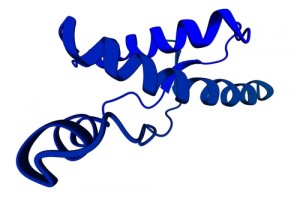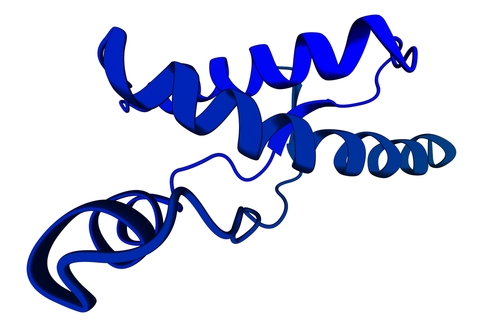 A new study about diseases such as Cystic Fibrosis that are associated with “Protein misfolding” entitled “Modulation of the Maladaptive Stress Response to Manage Diseases of Protein Folding” was published in PloS Biology by Dr. Daniela M. Roth, part of the group of Professor William E. Balch, at Department of Cell Biology, The Scripps Research Institute, La Jolla, California, USA, and colleagues.
A new study about diseases such as Cystic Fibrosis that are associated with “Protein misfolding” entitled “Modulation of the Maladaptive Stress Response to Manage Diseases of Protein Folding” was published in PloS Biology by Dr. Daniela M. Roth, part of the group of Professor William E. Balch, at Department of Cell Biology, The Scripps Research Institute, La Jolla, California, USA, and colleagues.
In this study, the authors used cells of patients and several animal models of diseases associated with constant protein misfolding and found that the cellular protection to protein misfolding, the “heat shock response,” was exacerbated. They also observed that if the “heat shock response” was decreased there were less symptoms of disease and the effect of therapeutics was enhanced.
“This has important implications for the treatment of many human diseases,” said Professor William E. Balch, senior author of the study, in the press release.
In cystic fibrosis, the majority of the patients have a specific mutation in the two alleles of the gene that encodes for transmembrane conductance regulator (CFTR) protein, an ion-channel protein that regulates the levels of cellular chloride in various tissues, such as the lungs. The deficient CFTR protein, due to its unstable structure, is normally bounded by “chaperone molecules,” i.e. molecules that help a protein to acquire the correct functional structure, in the cell to enter the degradation process. Therefore, very few deficient CFTR proteins reach the cell membrane to function as a chloride channels.
Recently, many research groups including Balch’s group have shown that the chaperones that bind the deficient CFTR belong to the heat shock response machinery, an important system that protects cells from protein misfolding induced by many factors such as excess heat and oxidation.
[adrotate group=”3″]
“The conventional view in the field of misfolding diseases for many years has been that boosting the heat shock response and chaperone levels to improve protein folding should be therapeutic in many protein-misfolding diseases,” said Dr. Daniela M. Roth. “That may not be the case when misfiled proteins are produced chronically, and the heat shock response stays elevated,” added Dr. Roth.
In this study, the researchers induced an artificial stress response by overproducing the active form of heat shock factor protein 1 (HSF1), a transcription factor protein that is the main trigger for this heat shock response. The results confirmed that shocking bronchial epithelial cells, the target cell type in cystic fibrosis, bind and degrade the deficient CFTR. Thus, it seems that heat shock response contributes for the development of cystic fibrosis. Moreover, these cells that contain the deficient CFTR developed an exacerbated heat shock response triggered by the presence of the misfolding CFTR proteins. When the production of deficient CFTR was inhibited in these cells, the heat shock response features returned to normal. The researchers found that inhibiting the HSF1 activity reduced the binding of deficient CFTR by the chaperones, allowing more protein to reach the cellular membrane and perform its activity, i.e. regulate the levels of chloride.
Dr. Jeffrey M. Beekman and Johanna F. Dekkers used “organoids,” aggregates of tissue obtained from patients with cystic fibrosis , as a cystic fibrosis model to inhibit HSF1 with the triptolide, a diterpenoid compound with an activity against mouse models of polycystic kidney, and VX-809, a potential drug for the treatment of cystic fibrosis. Both drugs showed a potent combined effect leading to a significant reduction in disease symptoms when compared to treatment with VX-809.
“It appears that having more heat shock chaperone activity exacerbates the signs of cystic fibrosis, whereas reducing that activity may be a way to treat the disease,” said Prof. Roth.
The study also suggested that a constant exacerbated heat shock response would ultimately cause an impairment of the correct folding of many other proteins in cells. “This broad impairment presumably reduces the ability of cells to function correctly in many folding reactions, which would compound the disease pathology,” said Prof. Balch.
The findings obtained from the cystic fibrosis models led the researchers to investigate if similar phenomena would occur in other cell models of the genetic disorders like the disease associated with the deficiency of alpha-1-antitrypsin and Niemann-Pick disease. In both diseases, cells containing the deficient misfolded proteins had an exacerbated heat shock response and the inhibition of HSF1 improved the outcome.
Dr. Richard I. Morimoto and Dr. Ning Wang investigated if a similar process would happen in a frequently used animal model of protein misfolding, the C. elegans. The amyloid beta 42 peptide, an important peptide associated with Alzheimer’s disease, was overproduced in muscle cells of the C. elegant, and that the peptide formed aggregates and most of the worms developed paralysis. The activity of HSF1 was also exacerbated in muscle cells containing the aggregates and the inhibition the activity of HSF1 reduced the amount of worms with paralysis. These observations suggested that the maladaptive response has been conserved through evolution.
In addition, to strengthen the former observations with the C. elegant Alzheimer’s model, researcher Dr. Eliezer Masliah used gene-deficient mouse models and found that the activity of HSF1 was exacerbated in the brain tissue when compared to the non-deficient mice.
“In general, it appears that the chronic production of misfolded proteins can lead to this ‘maladaptive stress response,’ as we call it,” said Prof. Balch. “Reducing the maladaptive stress response as a first line of defense could have an important impact on the progression and pathology in many diseases—from cancer to viral infections.”

